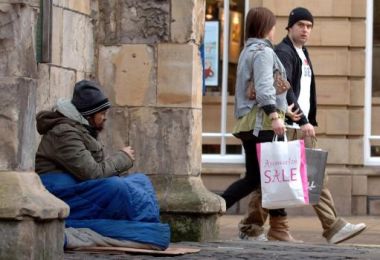Undercover actors posed as homeless people to find out how they are treated... and the results are shocking
'Mystery Shoppers' have put England's provision for homeless people to the test and found it wanting.
Homelessness charity Crisis sent eight aspiring actors, all with previous experience of homelessness, out to 16 local authorities to examine the quality of advice and assistance they provide to single homeless people.

Each mystery shopper took the role of a different character to explain why they needed help with their housing. These were based around one of four characters which were drawn from real life situations: someone who had been forced to sleep rough after losing their job, a young person who had been thrown out of the family home, a victim of domestic violence and a very vulnerable person with learning difficulties.
The Turned Away report says that in 37 visits out of 87 made in total, local authorities made arrangements to accommodate the actors that evening. In the remaining 50, most of which were to London boroughs, they received inadequate help. The report says: "It was common for mystery shoppers to simply be signposted to written information about renting privately or even turned away without any help or the opportunity to speak to a Housing Adviser."
It also says that "lack of privacy, interactions with staff, the office environment, and waiting times – all had a profound impact and often compounded feelings of anxiety, stigma and shame".
They reported interviews being interrupted by other staff, long waiting times without explanation and a lack of empathy from their interviewers. One 'shopper' in outer London acting the part of the victim of domestic violence reported: "I was heartbroken ... again from my personal experience, if I got treated like that then I probably would have become very suicidal or depressed, because these are the people that are supposed to help you and they could see I was worked up... They had no empathy whatsoever."
Introducing the report, Crisis chief executive John Sparkes said that it "shows that too many homeless people get little or no help because they are not deemed to be in 'priority need' – meaning the local authority has no legal duty to house them".
He continued: "Local authorities now have a legal duty to house families, but it is much harder for single people, who only qualify for housing if they are particularly 'vulnerable'. In practice this is incredibly difficult to prove, as this report clearly shows."
Sparkes called for "far-reaching change" in homelessness policy and called on political parties to make manifesto commitments to reviewing the law.
Alison Gelder, chief executive of Churches' homelessness charity Housing Justice, said that she was not surprised the report's findings. "It chimes exactly with what we hear of the experience of churches helping homeless people," she told Christian Today. She said that the response of local authority to a shortage of resources and the failure to build more social housing was to 'gatekeep' or restrict access to services. "If there is no statutory duty to help they will just try to fob people off and send them away," she said. "These people are a low priority."
However, she added that there were examples of good practice and that poorly-performing authorities should learn from better ones. "There is no reason why every authority should not be as good as the best," she said. "They are all struggling with the same lack of resources."
Ms Gelder said that more social housing should be built and that more should be done to prevent people becoming homeless in the first place. She added that churches had an important role to play: "Christians can find out how their local authorities are performing and lobby their councillors. People in churches are often established members of the community; they can be a voice for those who are not."
Cllr Peter Box, Chair of the Local Government Association's Environment, Economy, Housing and Transport Board, told Christian Today: "It is a tragedy when anyone becomes homeless and councils work hard to prevent homelessness occurring in the first place. However, where homelessness does take place councils have an important role to treat people who need their help with respect and to place them into secure, affordable accommodation.
"The ability of councils to do this is only getting tougher as a result of 40 per cent cuts to council budgets over the lifetime of this Parliament and a shortage of affordable housing. The council housing waiting list has increased by a third over the last 10 years to 1.7 million households and overall there were just 112,000 homes built in England in 2013.
"It is in everyone's interest to remove unnecessary barriers which prevent homes being made available to those people who desperately need them. Councils are keen to play their part in this and could go further and faster to support the development of badly needed new homes if government gave councils greater financial flexibility."











